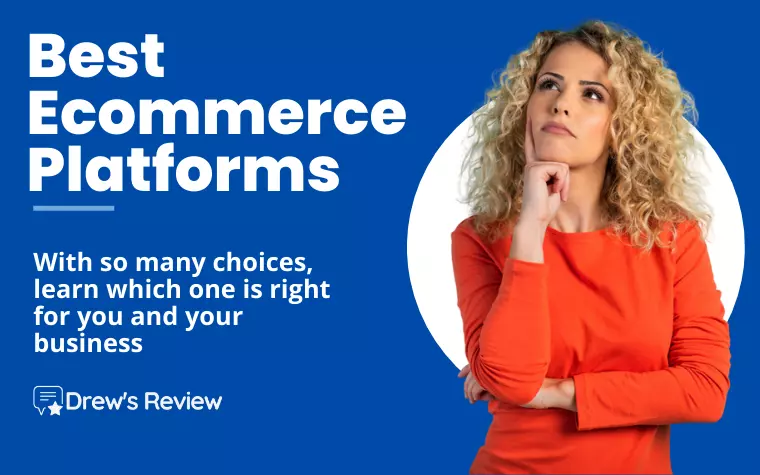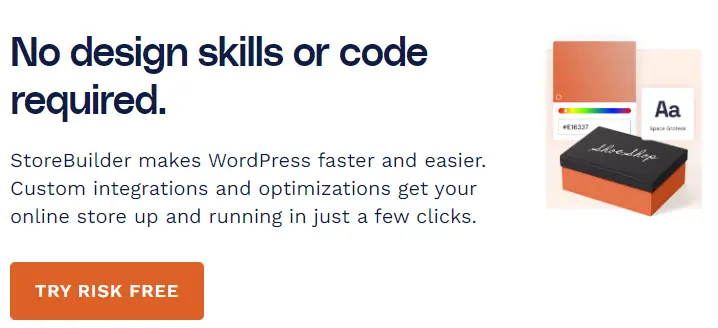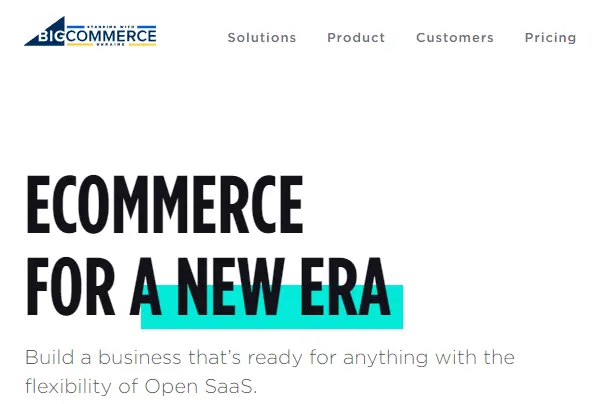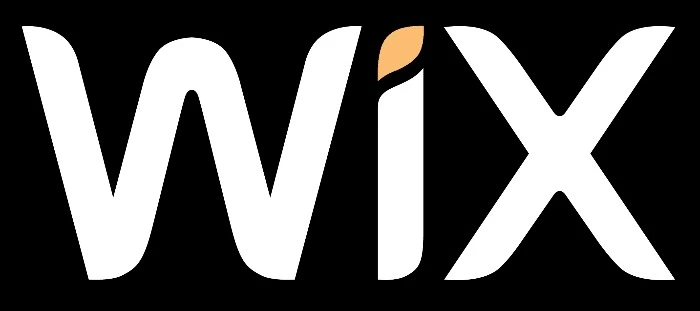
If you are looking to start an online store, you will need to choose a platform on which to build it. There are many different platforms available, each with its own advantages and disadvantages.
In this article I will discuss the 7 best ecommerce platforms for 2024. I will rate and review each platform so that you can make an informed decision about which one is right for you!
The reviews of these platforms will be based on things like price, product options, reliability, scalability, features, support, and so on.
Since no two online stores are the same, there's a platform for every type of business. For example, some stores will only have a few products compared to others that have hundreds. So the type of ecommerce platform needed will be different.
Any ecommerce platform should allow you to add products quickly and effectively. It should also allow you to offer discount coupons and track inventory.
The management of shipping and fulfillment is also an important consideration for any ecommerce platform. This will allow you to focus more on what's important with your business.
The 7 Best Ecommerce Platforms
Here are my picks:
1. Nexcess StoreBuilder - Best Overall
Nexcess StoreBuilder is great for those that want a high-performing store without having to worry about doing any coding.

StoreBuilder is very easy to maintain, is accompanied by advanced tools and is very flexible. If you can imagine what your store should look like, StoreBuilder can be customized to acheive that look with ease.
With StoreBuilder, you'll start with a choice of the many different templates available. You can further customize the template you choose to make your store look how you want it.
It runs on WordPress and hosting is included. WordPress is the most popular platform to use and not just with ecom stores. More than 40% of the web has sites built with WordPress. The pages load fast so there's no worry about your customers leaving due to slow load times.
The support is excellent and it's open 24/7, 365 days a year so no matter where you are in the world you'll always have access to help.
What I really like about StoreBuilder is the premium features that are included for such a low price. On top of that, and this is probably the best thing - no transaction fees. Unlike online stores with Shopify or Squarespace, you are not subject to fees.
Pricing
$19 a month. Free for the first 30 days.
2. Shopify - Best for Small to Medium-Sized Stores
Shopify is probably the most recognizable of the many ecommerce platforms out there. It's beginner-friendly but also capable of handling a very popular and successful store.
Just like StoreBuilder, it's very easy to use. Most people that i've spoken to found it very easy to use, and they were beginners as well.
Also, their technical support is great. I remember when I set up my first store on Shopify, I was in and out of chat support whenever I ran into a snag. They were always there to help so for beginners, it's a great choice.
Shopify Advantages
Tons of addons: With more than 3000 free apps built for this ecommerce platform, Shopify has most of all. There are paid apps as well, but this could add up quickly. However, there are also premium Shopify themes that you can use which include many apps that are normally paid - which will save you on monthly fees.
Scalability: If you need multiple staff accounts, a variety of different currencies and inventory locations, Shopify allows this even with the entry-level plans. I particularly like the bulk editing feature which allows you to edit a lot of items all at once.
Support & Knowledgebase: As I mentioned before, Shopify provides excellent 24/7 customer support. Even without the support, you can almost always get an answer to your query from their robust knowledge base. There was hardly a question I could find unanswered in their knowledge base when I first started out.
So if you're just starting an online store you might want to consider Shopify. It's one of the biggest platforms for any ecommerce site.
Pricing:
- Lite: $9 / month
- Basic: $29 / month
- Shopify: $79 / month
- Advanced: $299 / month
3. BigCommerce - Best for Large Inventory Stores
On the flip side, if you are planning to create a large store, BigCommerce is the best ecommerce platform for your online store - just as the name suggests.

It compares to Shopify, as both have a similar suite of services. Pricing is also almost identical. However, when it comes to a large-scale ecom store, BigCommerce wins.
Some of the reasons for this are:
Complex management of inventory: With BigCommerce, you can have up to 600 variants attached to any SKU. Normally large stores have many different variants, so having this many available makes BigCommerce a great ecommerce platform choice.
Channel Management: Platforms like Facebook, Instagram, Amazon, Walmart, and eBay are all supported with BigCommerce. You'll be able to adjust settings, keep track of earnings and understand your customers.
An unlimited number of user accounts: Need multiple users to log in and manage your store? You can have as many staff accounts as you wish. Logins can be done across the glove as well so you're not restricted to logging in from one country only.
Built-in Functionality
There's a lot of functionality with BigCommerce. Things like discount coupon codes, bulk pricing, and volume pricing is all included.
You won't need any special plugins as there are many functions custom coded into the BigCommerce ecommerce platform.
Pricing
- Standard: $29.95 / month
- Plus: 79.95 / month
- Pro: $299.95 / month
4. Zyro - Best for Beginners and Small Businesses
If you're a beginner or a small business, pay attention to Zyro.

Zyro is a powerful ecommerce builder with all the features you will need to succeed.
It has a drag and drop interface that's incredibly easy to use. Newbies will have no problems creating a beautiful ecommerce site with this platform.
Advantages of using the Zyro Platform:
Using Zyro's templates, you have the ability to create either a very simple or elegant design.
Managing your store is very easy with Zyro. The interface is very intuitive yet easy to use. This makes managing your inventory an easy task that will free up lots of time.
Marketing Tools: Zyro provides you with a ton of marketing tools to help you create social media ads, email campaigns, and more.
Payment options: There are more than 70 payment options available with Zyro. This will offer more flexibility depending on the countries you target.
You are also provided with discount codes to ensure you get extra sales and grow your customer base.
Shipping management: Zyro manages this for you and taxes as well. It's all regulated so you can be sure it's done right and on time.
Zyro Pricing
- Website: $2.62 / month
- Business: $4.41 / month
- Online Store: $8.01 / month
- Advanced Store: $14.31 / month
5. Wix - Best for Stores With Less than 100 Products
Wix is great for smaller-sized stores. It's also great for those that want some flexibility with how it looks, rather than some existing "canned" website template.

Wix is a very popular website builder, but you can upgrade it to ecommerce functionality for just $20 a month.
Wix is known for having a ton of high-quality designed templates. You won't need to "learn to code" with Wix.
You can choose from a large selection of product galleries to layout your products as you wish. The end result looks great on both desktop and mobile devices.
For payment processing, there are many different options available with Wix. Global tax and shipping are also handled so there's no need to worry about the best shipping methods or if you should charge tax or not.
You also get discount codes to enable coupons on your site which will increase sales and build customer satisfaction.
Customer support is great with Wix, offering it 24/7.
Pricing
- Combo: $14 / month
- Unlimited: $18 / month
- Pro: $23 / month
- VIP: $39 / month
6. Ecwid - Best eCommerce Platform for Existing Websites
If you have an existing website and would like to add ecommerce functionality to it - in other words, start a store within your site - eCwid is a great choice.

Ecwid is popular, fast, and reliable. It even won an award for the "fastest ecom implementation" by G2 Crowd.
If your site is already on a platform like WordPress, Joomla, or Drupal, then it's even easier to integrate Ecwid. This is due to the built-in integration.
Ecwid is flexible and allows you to sell your products on sites like:
- eBay
- Amazon
Customizations are easy and look great on both mobile and desktop. This will allow for maximum visibility of your products - so you can sell more.
As for taking payments, Ecwid integrates with over 50 payment gateways. These include Paypal, Stripe, Square, and more.
With Ecwid, you'll have these other features and benefits:
- Inventory tracking
- Customer address book
- Ability to save favorite products
- Smart shipping calculations
- Automatic updates
- Simple checkout process
Ecwid is a feature-rich platform and easy to implement for beginners. You don't need any coding skills.
Pricing
- Free plan: You can sell 10 items for month completely free
- Venture Plan: Can sell 100 items for $12.50 / month
- Business Plan: 2500 items / $29.27
- Unlimited Plan: all sales channels / $82.50 a month
If you're running a website already, start with the free plan. You can always upgrade later once you start selling more.
7. Magento - Best for Large Stores and Advanced eCommerce Users
Magento is one of the best-known ecommerce platforms in the world. It's rather complicated which is why I have it listed best for advanced users only.

Magento supports MVC and OOP architecture. If you're a web developer you'd be happy to know that but if not, it's something that's beyond your comprehension.
However, with complications come benefits. Magento is widely used for good reason due to the versatility of this ecommerce platform.
Magento has recently evolved to Magento 2, which is more robust than its predecessor.
Some of the benefits of Magento eCommerce Includes:
- Rich and robust features
- A large community of users
- Can host the software on many different platforms
- Strong SEO built in
- 1 - Click selling
Pricing
Magento ain't cheap! Licensing fees begin at $1988 a month. This does not even include a domain name or hosting. As I mentioned earlier, it's only for advanced users and large stores. Beginners should steer clear of Magento for obvious reasons.
How to Choose the Right Ecommerce Software for You?
There are a lot of factors to consider when choosing ecommerce software.
The first step is to identify your needs. For example, if you're selling physical goods, you'll need software that can manage inventory and shipping. If you're selling digital products, you'll need software that can handle downloads and access codes.
Once you know what you need, you can start looking at different software options. There are a lot of great ecommerce platforms out there, so take your time and research your options.
Figure out which one has the features you need and that fits within your budget. Once you've made your decision, be sure to test out the software before launching your store. This will help you ensure that everything is working properly before going live.
By following these tips, you should be able to find the right ecommerce software for your business.
Conclusion
In conclusion, choosing the right ecommerce platform is essential for any online business. There are a lot of great options out there, so take your time and research your options.
The ones I have listed above are all excellent platforms but they won't suit everyone. Each business is different and i've included the best options for each category to make the decision easier for you.
Questions or comments? Comment below.
Related Articles
- Best Ways to Make Passive Income on YouTube - April 15, 2024
- How I Make Faceless YouTube Channels With AI - April 9, 2024
- Top 21 Faceless YouTube Niches to Earn Big Profits in 2024 - April 3, 2024

